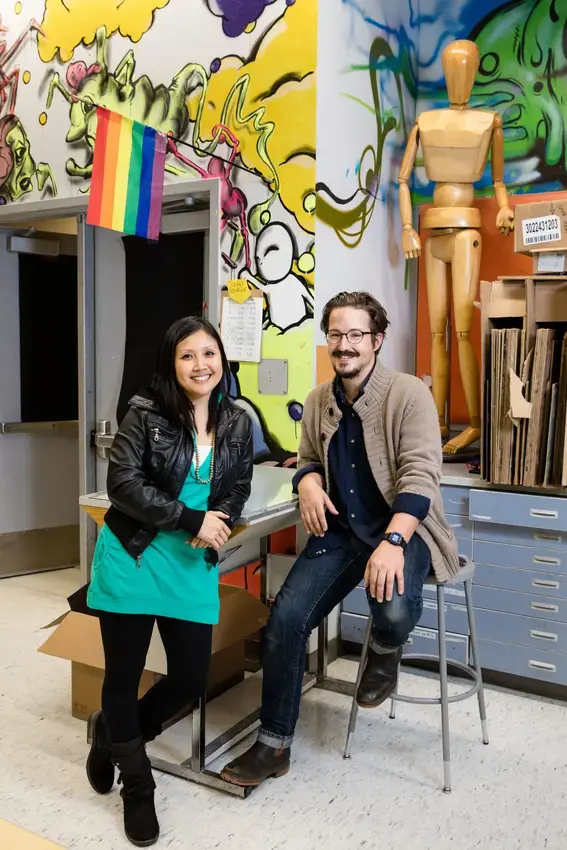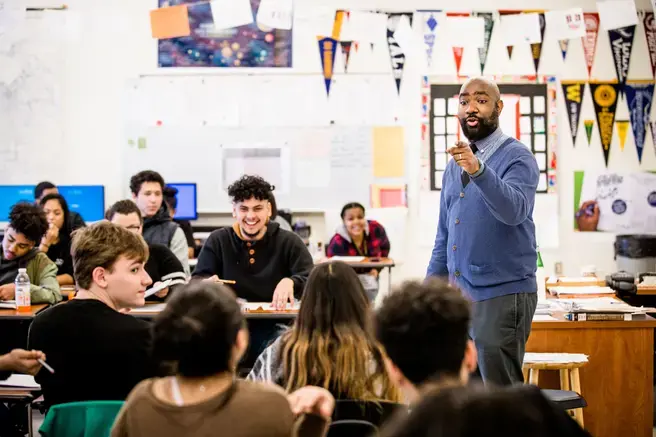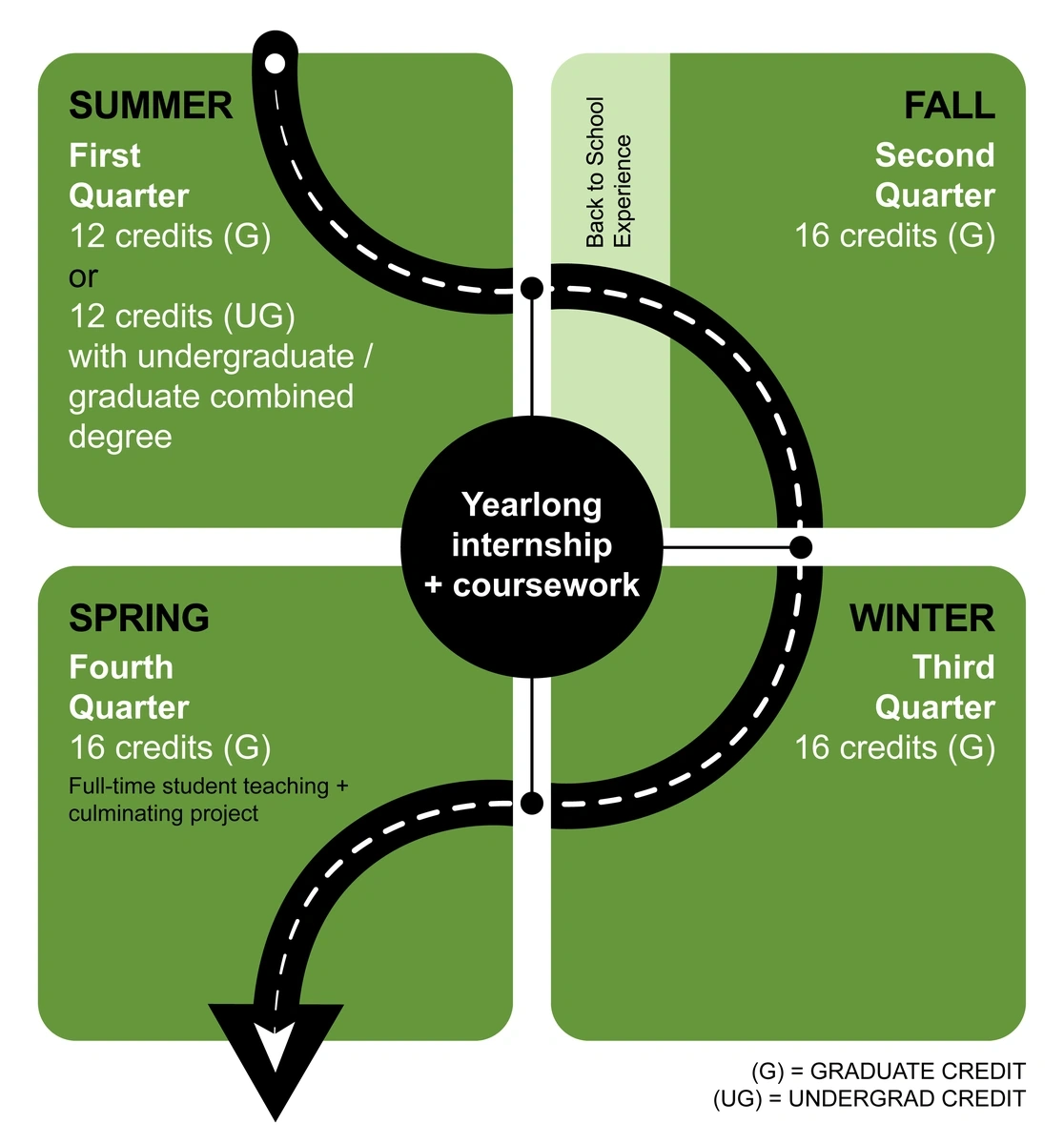Teach, Learn, Grow.
Evergreen's Master in Teaching (MiT) is for aspiring teachers who wish to uplift the next generation.
- Discover how to center social justice and a joy for learning in your instruction
- Connect with a robust network of faculty and mentor teachers
- Engage and empower school and community voices in addressing inequity and advocating for change
Program Overview
How you'll learn
Graduates from the MiT program receive a master's degree, a recommendation for Initial Teacher Certification in Washington state, a content area endorsement and an ELL endorsement. This degree takes you from theoretical approach to teaching with students in the classroom.
This full-time, four-quarter program certifies prospective teachers in areas ranging from elementary education to secondary sciences, humanities and arts. Learn more about Endorsements
Every new cohort starts in Summer Quarter and graduates at the end of the following Spring. Courses take place in the evenings and weekends during fall, winter, and spring quarters.
With a cohort of dedicated teacher candidates, supportive faculty, staff, mentor teachers and community mentors, your learning about teaching will happen through a range of experiences.
With options like undergraduate/graduate combined degree and alternate routes, our program meets you where you are so you can get education that meets your needs. Learn more about eligibility
To complete the program, teacher candidates must earn 60 credits, including successful completion of student teaching and an end-of-program culminating project.
Credit Overview
| Credit Source | Number of Credits |
|---|---|
| Core Courses | 34 - 40 Credits |
| Field Credits | 20 - 26 Credits |
| Total Credits | 60 Credits |
See specific courses in the Academic Catalog
What You Can Do With Your Degree
Become a Washington state teacher
Graduates go on to teach all levels of K-12, as well as join other education related fields. Many become award winning educators and leaders in their fields. Evergreen graduates have a high placement rate and are respected across the region and beyond.
Become a Teacher in Washington State!
When you graduate, you will be a teacher who:
- Develops knowledge of and value for their students’ multiple and interlocking identities as they plan, teach, assess and communicate with students, families and caregivers.
- Engages positive communication with families and caregivers grounded in cultural humility and in service of supporting student well-being.
- Engages in conversations, planning and actions that address and seek to change racist, ableist, settler colonial, classist, sexist, xenophobic and transphobic policies, practices and curriculum.
- Helps create and support a caring, respectful, culturally sustaining learning environment characterized by a sense of community where all participants feel safe, valued and connected.
- Implements culturally responsive classroom routines that provide student agency and voice in designing and adjusting routines to support community learning and student well-being.
- Plans vibrant lessons, units and other learning opportunities integrating school curriculum, community cultural wealth and the big ideas in state/national standards.
- Engages students in inquiry, questioning and discussion within and across disciplines.
- Engages students socially and intellectually, supporting their relationships, collaborations, curiosities, literacies, critical thinking and well-being. This includes multiple ways for students to engage and represent their ideas and questions.
- Engages multiple strategies for collecting and using formative assessments that elicit understanding, analyze progress and provide constructive feedback.
- Builds collaborative relationships with school colleagues, community educators, families and caregivers.
Attend an Information Session
Join us to learn about more about the MiT program. To register for an online session, select the date that works best for you and complete the registration form. All sessions are Pacific Standard Time (PST).
Use the "Request Information" button above or email Master In Teaching for more information. We look forward to seeing you!
MiT Information Sessions
All sessions are Pacific Standard Time (PST)
Cohorts
Our cohort model brings together teacher candidates of all endorsement areas to share in the same coursework and field experiences throughout the program, preparing teachers to work across differences and serve multilingual learners. Your learning about teaching will happen through a range of experiences alongside a cohort of dedicated teacher candidates, supportive faculty, staff, mentor teachers and community mentors.
Cohort Model
Teacher candidates will be prepared to pursue careers in their chosen endorsement area and earn an English Language Leaner endorsement. An EL endorsement prepares you for multiple models of teaching such as stand-alone EL K-12 classrooms, K-12 integrated EL elementary and secondary content-area classes, dual language programs and push-in/pull-out EL instructional approaches.
Students receive focused and supportive mentorship from faculty, while learning in their own classrooms and during student teaching. Students will be placed in the field for the entirety of the program, gaining a full year of classroom experience.
The year-long field experience will include the equivalent of one quarter of ELL field experience and two quarters of a field experience in your chosen endorsement area.
Schedule Overview
| Summer Quarter | Online and in-person coursework in the daytime and evenings |
| Fall Quarter | Class 2 evenings per week and some weekends, field experience during the day 15 hours/week |
| Winter Quarter | Class 2 evenings per week and some weekends, field experience during the day 15 hours/week |
| Spring Quarter | Class 1 evening per week, field experience full-time (40 hrs/week) during the day |
You may have 2 field placements: one in an EL classroom and one in your content area classroom.
Student Teaching
Our students receive field placements continually for one academic year. The yearlong field experience allows you time to see a school year from beginning to end while you build and practice your teaching skills across the academic year.
As a teacher candidate, you will be placed with an accomplished mentor teacher in a public school classroom. Your mentor teacher works in partnership with your faculty to support you throughout your field experience.

Our Graduates
Evergreen graduates have high placement rates and are respected across the region and beyond as teachers and educators. Many MiT grads have gone on to become award winning educators and leaders in their fields - winning local, regional, and national awards.
A New Generation of Innovators and Advocates
Notable Alumni
Alumni have crafted creative, interdisciplinary lessons.
Matiah Shaman, MiT '13, teaches physical science to high school students. Last year Matiah's class ended a unit about engineering design and electrical circuits by building remote-control sumo-wrestling robots from scratch.
Katie Baydo Reed, MiT '06, teaches fourth graders about the use of the Washington State Fairgrounds as a Japanese internment camp during World War II.
They have spoken out about the value of teaching and the need to advocate for all students.
Jerad Koepp, MiT '08, Wukchumni, Native Student Program Specialist for North Thurston Public Schools. He was the 2022 Washington State teacher of the year, and the first Native American educator to earn the distinction in the state. He is a leader in Native education, policy, and government to government relationships.
Nathan Gibbs-Bowling, MiT '06, Lincoln High School teacher, was a panelist for The Seattle Times LiveWire Event (March 2017). Nathan explained why schools serving low-income students need more funding than other schools and how the current system provides the opposite.
Ted Cohn, MiT '03, spoke about the privilege of teaching at The Seattle Times Annual Ignite Education Lab storytelling event (February 2017).
Awards and Recognition
by Year
2024
Angela Hannah, MiT ‘15, Lincoln Options Elementary, Olympia School District, Evergreen Distinguished Educator of the Year Award
2022
Jerad Koepp, MiT '08, North Thurston Public Schools, Washington State Teacher of the Year
Spencer Olmsted, MEd '12, Finalist for the Presidential Award for Excellence in Math and Science Teaching
2021
David Buitenveld, MiT '15, Nisqually Middle School, ESD 113 Regional Teacher of the Year
2019
Devin Alexander, MiT '04, Olympia School District Elementary Teacher of the Year
Wayne Au, MiT '96, The Evergreen State College Distinguished Educational Leader of the Year
Lauren Roberts, MiT '07, The Evergreen State College Distinguished PK-12 Educator of the Year
2018
Chimere Hackney, MiT '10, The Evergreen State College Distinguished PK-12 Educator of the Year
2017
Katie Agren, MiT '07, NTEA Teacher of the Year for Chinook Middle School
Wayne Au, MiT '96, Society of Professors of Education William H. Watkins Award winner
Fred Ericson, MiT '01, NTEA Teacher of the Year for River Ridge High School
Nathan Gibbs-Bowling, MiT '06, Evergreen's Joseph Albert Dear Distinguished Alumni Award winner
Rand Hodgson, MiT '10, The Evergreen State College Distinguished PK-12 Educator of the Year
Tim Holman, MiT '99, WHAS11 & LG&E Excellence in Classroom and Educational Leadership Award winner
Alex McCarty, MiT '02, featured in the Evergreen Magazine - 2017 Winter Issue
Ingrid Morais, MiT '12, Washington State PTA Outstanding Educator
Amy Solomon-Minarchi, MiT '11, Olympia's first Poet Laureate
Chelsea Thomas Altrum, MiT '11, NTEA Teacher of the Year for Timberline High School
Pamelia Valentine, MiT '99, NAEA School of Art Leaders participant
2016
Jim Anderson, MiT '02, Washington State Forensics Association Coach of the Year
Justin Brooks, MiT '06, Lochburn Middle School Teacher of the Year
Kelly Cowgill, MiT '15, featured in the Oregon Education Association's quarterly publication
Nathan Gibbs-Bowling, MiT '06, Washington State Teacher of the Year
Betty Hicks, MiT '02, Washington State PTA Outstanding Educator
Theresa Holland-Schmid, MiT '93, ESD 114 Regional Teacher of the Year
Nicole Laib Rutledge, MiT '07, Yelm Community Schools Secondary Teacher of the Year
2015
Elisabeth Rene Avnet, MiT '05, Herbst Foundation Award for Teaching Excellence recipient
Nikki Dunbar, MiT '12, Highline School District Ducky Award Recipient
Nathan Gibbs-Bowling, MiT '06, Pierce College distinguished alumni
David Hunter, MiT '11, NCGE Outstanding Support for Geographic Education Award recipient
Erin Landvatter, MiT '00, North Kitsap School District Rangveld Kvelstad Teacher of the Year
Kasinda Starmer, MiT '12, NTEA Teacher of the Year for Chinook Middle School
Cindel Tobias, MiT '10, The Evergreen State College Distinguished PK-12 Educator of the Year
Joanna Tovar Barnes, MiT '10, National Endowment for the Humanities Grant recipient
2014
Victoria Benson, MiT '05, North Thurston School District Cause for Applause Award recipient
Liz Fegley, MiT '10, Woodbridge Senior High New Educator of the Year
Mike Fekete, MiT '11, St. Mary of the Assumption School Ann Anderson Teacher of the Year
Nathan Gibbs-Bowling, MiT '06, Milken Education Award recipient
Nora Hallet, MiT '01, Washington Association for Language Teaching Teacher of the Year
Susi O'Bryan, MiT '02, Nisqually Middle School Teacher of the Year
Sean Riley, MiT '05, The Evergreen State College Distinguished PK-12 Educator of the Year
Jeremiah Tuckett, MiT '06, South Sound High School Teacher of the Year
2013
Rob Cahill, MiT '08, The Evergreen State College Distinguished PK-12 Educator of the Year
Angela Farley, MiT '99, NTEA Teacher of the Year for River Ridge High School
Pamela Valentine, MiT '96, ESD 113 Regional Teacher of the Year
Mentor a Student Teacher
Bring your teaching expertise and professional curiosity to the experience of mentoring a teacher candidate for an entire school year.
Using a number of co-teaching strategies allows the mentor teacher, the teacher candidate and the faculty mentor to play active and collaborative roles throughout the entire field experience.
Contact the program for more information at mit@evergreen.edu.

